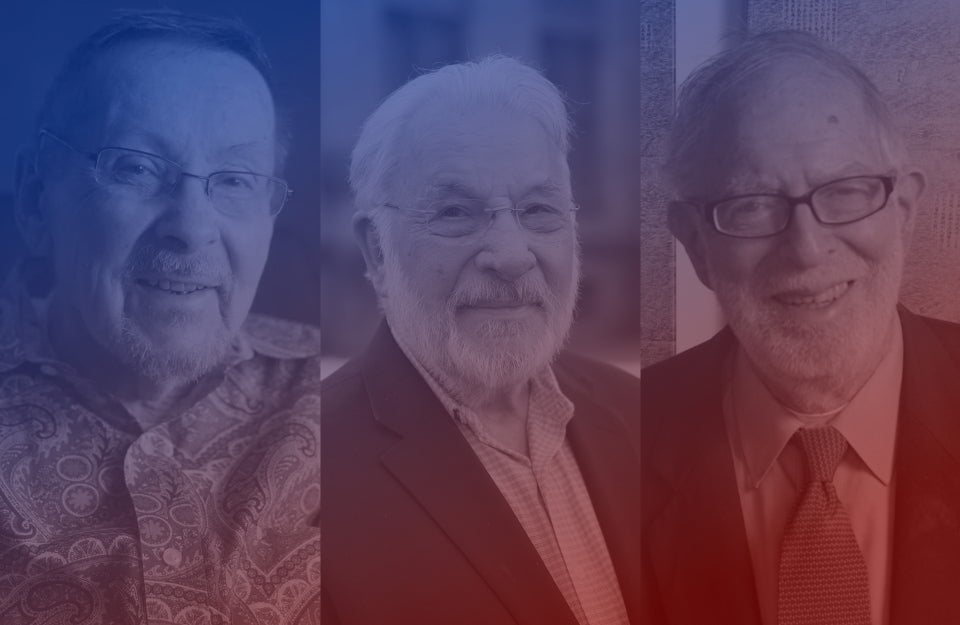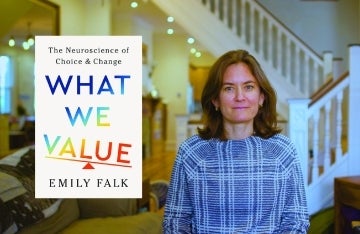In Their Own Words: Charles R. Wright, Klaus Krippendorff, and Monroe Price
Oral histories from these three distinguished Communication scholars are now available online in the Annenberg School for Communication Library Archives.

L-R: Charles R. Wright, Klaus Krippendorff, and Monroe Price
Monroe Price has some incredible stories. He clerked for the Supreme Court, dated Norah Epron, sold encyclopedias door-to-door in North Carolina, and was a footnote checker on the Warren Commission Report.
As Price tells these stories, the voice of Jeff Pooley, Professor of Media and Communication at Muhlenberg College, occasionally prompts him with a question. For the past eight years, Pooley has been visiting and recording key figures in the field of Communication, creating oral histories that document for posterity the trajectories of their lives and their work.
Last month, the life stories of two scholarly greats — told on video and audio in their own words — became available on the Annenberg School for Communication Library Archives’ (ASCLA) “Communication Scholars Oral History Project” website: Klaus Krippendorff (1932 - 2022) and Monroe Price (1938 - ).
They joined the already available oral history from Charles R. Wright (1927 - 2017), and will soon be in good company with the release of a life history from Emeritus Professor Oscar Gandy (1944 - ).
These oral histories shed light on many milestones in the field of Communication, from Wright’s development of the seminal text, Mass Communication: A Sociological Perspective, to Krippendorff's creation of “Krippendorff’s Alpha,” to Price’s work on communications law.
“When combined with other resources at the library, these interviews give students and researchers a better understanding of an individual and of the field,” says Samantha Dodd, lead archivist at ASCLA. “At the library, we have analog materials — people’s letters, research files — but when a student listens to the audio of an oral history, they get more insight into how a person thought, how they communicated, how they lived.”
Recording Histories
The oral history project started as an effort to record the histories of senior Annenberg scholars after the Annenberg library received a monumental gift — the papers of Professor Emeritus Elihu Katz (1926 - 2021), one of the founding figures in the field of Communication in 2013.
Pooley, who had been a visiting scholar at Annenberg, talked to former librarian Sharon Black and began interviewing Annenberg scholars in their homes.
His first interview was with Charles Wright, and he then spoke with Klaus Krippendorff, Monroe Price, and most recently, Professor Emeritus Oscar Gandy and longtime Penn faculty member Larry Gross, now Professor Emeritus at USC Annenberg. The interviews with Gandy and Gross are still being processed.
“There's a kind of intimacy in talking to someone in their home, with family members wandering in and out and personal artifacts grabbed and displayed,” Pooley says. “As a Communication scholar myself, it’s very illuminating. You get to see the field in a new way.”
Expanding the Project
In 2021, current Annenberg Librarian Katie Rawson and Pooley decided to make use of Zoom and open up the project to scholars beyond the Annenberg School.
“Online interviews allow us to talk to senior Communication scholars around the world who are worthy of being interviewed in this intense format and bring different perspectives and identities than the scholars we've interviewed so far,” Pooley says.
“If a person has had an impact on the field of Communication, we want to talk to them,” Dodd says. “Zoom has been a great platform for giving us the option to expand representation and diversity in our archives.”
The ASCLA team has a long list of potential interviewees from around the globe.
A Growing Collection
With collections that contain the papers of Elihu Katz, George Gerbner, and Herbert Schiller, as well as the early records of the International Communication Association, ASCLA has become one of the main centers of archival material on the history of the field of Communication.
Pooley and Dodd are keen to expand the collections.
“In a sense, we are lucky, because Communication is younger than most disciplines, at least in its organized form,” Pooley says. “Some of the earliest and most important scholars in the field’s early history are still alive.”
“We need to capture these stories while we have the resources and these folks are still around,” Dodd says.
Pooley, now the ASCLA Subject Consultant at Annenberg, says that conducting these histories has been one of the highlights of his career.
“Sharing moments with scholars whose experiences in life and over the course of their careers are so interesting and often moving and illuminating has been a total pleasure,” he says.



